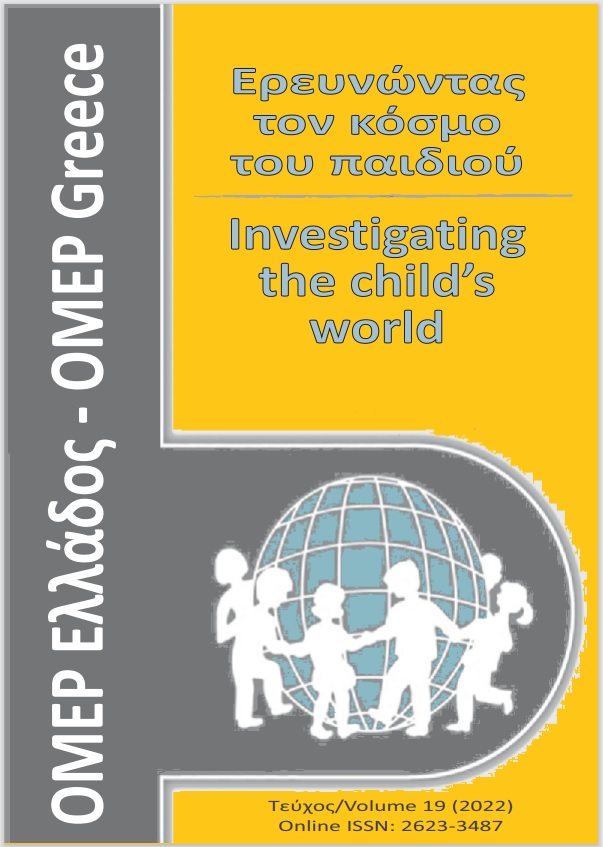Οι 1000 πρώτες μέρες ζωής, ο ρόλος του πατέρα και η βρεφική χειροπρακτική

Περίληψη
Η παρούσα βιβλιογραφική ανασκόπηση εξετάζει το ρόλο του πατέρα στα πρώτα περίπου 2 χρόνια ζωής του παιδιού. Η περίοδος αυτή που περιλαμβάνει τη σύλληψη του παιδιού έως και τα δεύτερα γενέθλιά του θεωρείται καθοριστικής σημασίας στη διαμόρφωση των βέλτιστων συνθηκών που θα θέσουν τα θεμέλια της μετέπειτα ανάπτυξής του. Με αναφορά στη θεωρία του δεσμού (attachment theory) συζητάται η σπουδαιότητα της ποιότητας της σχέσης μεταξύ πατέρα-βρέφους/νηπίου στα πρώτα χρόνια ζωής του τελευταίου. Γίνεται αναφορά σε ενδεικτικούς παράγοντες που φέρονται να επηρεάζουν τη διαμόρφωση της σχέσης αυτής και τέλος, προτείνεται ως μια μέθοδος ανάπτυξης και καλλιέργειας της σχέσης αυτής η πρακτική της βρεφικής χειροπρακτικής (infant massage).
Λεπτομέρειες άρθρου
- Πώς να δημιουργήσετε Αναφορές
-
Τσερπέλη Ε., & Δαουλτζής Κ. Χ. (2022). Οι 1000 πρώτες μέρες ζωής, ο ρόλος του πατέρα και η βρεφική χειροπρακτική. Ερευνώντας τον κόσμο του παιδιού, 19, 44–64. ανακτήθηκε από https://ejournals.epublishing.ekt.gr/index.php/omep/article/view/31908
- Τεύχος
- Τόμ. 19 (2022)
- Ενότητα
- Επιστημονική αρθρογραφία & εκπαιδευτικές δράσεις

Αυτή η εργασία είναι αδειοδοτημένη υπό το CC Αναφορά Δημιουργού – Μη Εμπορική Χρήση 4.0.
Οι Συγγραφείς που δημοσιεύουν εργασίες τους σε αυτό το περιοδικό συμφωνούν στους παρακάτω όρους:
Οι Συγγραφείς διατηρούν τα Πνευματικά Δικαιώματα και χορηγούν στο περιοδικό το δικαίωμα της πρώτης δημοσίευσης ενώ ταυτόχρονα τα πνευματικά δικαιώματα της εργασίας προστατεύονται σύμφωνα με την Creative Commons Attribution License που επιτρέπει σε τρίτους - αποδέκτες της άδειας να χρησιμοποιούν την εργασία όπως θέλουν με την προϋπόθεση της διατήρησης των διατυπώσεων που προβλέπονται στην άδεια σχετικά με την αναφορά στον αρχικό δημιουργό και την αρχική δημοσίευση σε αυτό το περιοδικό.
Οι Συγγραφείς μπορούν να συνάπτουν ξεχωριστές, και πρόσθετες συμβάσεις και συμφωνίες για την μη αποκλειστική διανομή της εργασίας όπως δημοσιεύτηκε στο περιοδικό αυτό (π.χ. κατάθεση σε ένα ακαδημαϊκό καταθετήριο ή δημοσίευση σε ένα βιβλίο), με την προϋπόθεση της αναγνώρισης και την αναφοράς της πρώτης δημοσίευσης σε αυτό το περιοδικό.
Το περιοδικό επιτρέπει και ενθαρρύνει τους Συγγραφείς να καταθέτουν τις εργασίες τους μέσω διαδικτύου (π.χ. σε ένα ακαδημαϊκό καταθετήριο ή στους προσωπικές τους ιστοσελίδες) πριν και μετά από τις διαδικασίες της δημοσίευσης, καθώς αυτό μπορεί να οδηγήσει σε παραγωγική ανταλλαγή ιδεών και σκέψεων καθώς επίσης και σε γρηγορότερη και μεγαλύτερη χρήση και ευρετηρίαση της δημοσιευμένης εργασίας (See The Effect of Open Access).


